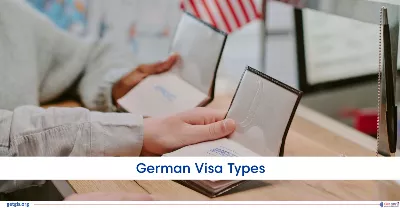Germany Visa Types: Requirements, and Application Process 2025
Updated On
-
Copy link
Planning to visit or stay in Germany? A German visa is an official document that allows foreign nationals to enter, stay in Germany for a specified period. Scroll through and find Germany visa types for Indians, requirements, and more.
Limited-time offer : Access a free 10-Day IELTS study plan curated for you

Table of Contents
- Overview of the German Visa for Indians
- Short-Term Visas (Type C) – Schengen Visa for Germany
- Transit Visa (Type A) – Germany Airport Transit Visa
- Long-Term Visas (Type D, National) for Germany
- How to Apply for a German Visa from India?
- Document Checklist When Applying for a Germany Visa Type
- Turn Your German Dreams into Reality with the Right Visa
A German visa is an official document that allows foreign nationals to enter, stay, and sometimes work or study in Germany for a specified period. There are mainly three categories of Germany visa types you should know about:
- Short-term (Schengen) Visa (Type C) for tourism, business trips, family visits, or short courses up to 90 days across the Schengen area.
- Long-term (National) Visa (Type D) for extended stays over 90 days, including Germany Work Visa 2025[/highlight], [highlight]German Student Visa requirements[/highlight], family reunification, research, and employment purposes.
- Airport Transit Visa (Type A) for travelers transiting through German airports en route to a third country.
Among these, popular specialized visas include the Blue Card Germany for highly skilled workers and the Chancenkarte visa, a points-based residence permit for job seekers.
Overview of the German Visa for Indians
|
Feature |
Schengen Visa (Type C) |
National Visa (Type D) |
|
Purpose |
Tourism, business, family visits, and short courses |
Work, study, family reunification, research |
|
Maximum Duration |
Up to 90 days within 180 days |
Over 90 days, the duration depends on the purpose |
|
Employment Allowed |
No |
Yes, with conditions |
|
Entry Type |
Single, double, or multiple entries allowed |
Usually single entry initially, multiple after permit issuance |
|
Coverage Area |
All 26 Schengen countries |
Germany only, limited travel in Schengen region |
|
Typical Requirements |
Passport, travel insurance, financial proof, accommodation, itinerary |
Passport, admission/job proof, financial proof, health insurance, and accommodation |
|
Processing Time |
Approx. 15 calendar days |
Several weeks to months |
|
Visa Fee (2025) |
Approximately EUR 90 for adults |
Approximately EUR 75 plus residence permit fees |
Short-Term Visas (Type C) – Schengen Visa for Germany
A Schengen type C visa for Germany, also known as a short-term visa, permits the holder to travel within the Schengen area for a maximum of 90 days within a period of 180 days. To apply for a Schengen visa (type C), individuals must go through the external service provider authorized to process such visa applications.
Here are the types of Schengen Short-Term Visas:
|
Visa Type |
Description |
|
Business Visa |
For individuals attending business meetings, conferences, and negotiations within the Schengen area. |
|
Cultural Visa |
For participation in cultural events like festivals, artistic performances across Schengen states. |
|
Medical Visa |
For seeking medical treatment or procedures in Germany or the broader Schengen area. |
|
Official Visit Visa |
For official governmental or diplomatic visits to the Schengen area. |
|
Other Short-Term Visas |
For specific purposes like sports events, religious celebrations, or official delegations. |
|
Tourism Visa (Germany Tourist Visa) |
For tourists wishing to visit Germany. |
|
Visiting Family or Friend Visa |
For individuals visiting loved ones residing in Germany. |
Requirements for Schengen Visas (Type C):
- Valid passport for at least 3 months beyond intended stay
- Completed application form and signed declarations
- Biometric photos meeting specified requirements
- Proof of travel insurance covering all Schengen countries with a minimum coverage of €30,000
- Proof of accommodation and travel itinerary
- Proof of financial means to support the stay
- Purpose-specific documents (invitation letters, event tickets, medical reports, etc.)
- Applicants aged 12 and above must appear in person for biometrics and application submission
Processing time generally takes about 15 days, but it is advisable to apply 15 days before your trip and no earlier than 6 months before.
Transit Visa (Type A) – Germany Airport Transit Visa
A Germany Transit Visa is intended for individuals who require a stopover at a German airport before continuing their journey to a non-Schengen country. With this visa, travelers are allowed to change flights within the international transit area of the airport for a maximum of 24 hours.
It is important to note that leaving the international transit area is strictly prohibited and against the law with this visa.
Countries Requiring a Transit Visa
|
Countries |
|
Afghanistan, Bangladesh, Democratic Republic of the Congo, Eritrea, Ethiopia, Ghana, India, Iran, Iraq, Jordan*, Lebanon, Mali, Nigeria, Pakistan, Somalia, South Sudan, Sri Lanka, Sudan, Syria, Turkey*, Lebanon |
Note: Jordan and Turkey citizens have some exemptions depending on passport type or valid visas from Australia, Israel, or New Zealand.
Transit Visa Exemptions
Many travelers are exempted if they hold a valid visa or residence permit from the following:
- EU, EEA, or Swiss member states
- Andorra, Canada, the United States, Japan, or San Marino
- Family members of EU/EEA citizens (spouses, children, dependent parents)
Transit Airports in Germany
There are some airports which are recognized with international transit zones including Berlin-Brandenburg, Frankfurt am Main, Munich, Hamburg (with time restrictions), and Düsseldorf (with time restrictions).
Also Read: Germany Transit Visa for Indians
Long-Term Visas (Type D, National) for Germany
There are many different visa types under long-term Visas. Let's take a look at each one of them and the validity of these visas.
|
Visa Type |
Purpose |
Validity |
Key Requirements |
Points to Remember |
|
Family Reunification Visa |
To join family members legally residing in Germany |
Initially 1 year, renewable |
Sponsor with settlement permit or EU Blue Card , financial support, basic German skills |
Minor children require custody docs; adult children must be unmarried and meet hardship criteria |
|
Research Visa |
For invited researchers at German institutions |
Validity depends on project duration |
Invitation letter, proof of funding |
Primarily for scientific research projects |
|
German Student Visa |
For university studies |
Initially 1 year, extendable up to 2 years |
Admission letter, financial proof, health insurance, language proficiency |
Extension requires proof of ongoing enrollment |
|
Student Applicant Visa |
To be physically present for university admission process |
3 to 9 months |
Proof of application acceptance or admission process |
No study permitted, only admission process |
|
Language Course Visa |
For studying the German language |
3 to 12 months |
Enrollment confirmation in language course |
Focused only on language learning |
|
EU Blue Card |
For highly skilled workers with job offers meeting salary threshold |
Up to 4 years, depending on contract |
University degree, job offer with salary ≥1.5× average German salary |
Provides work and residence rights, simplified mobility in EU |
|
Job Seeker Visa |
To search for employment in Germany |
Up to 6 months |
Proof of qualifications |
Work allowed only after securing job offer |
Looking for Scholarship to study in Germany, Explore Top Scholarships for Indian Students in Germany 2026
Take a look at this video to learn the benefits of a German job seeker visa
Contact GetGIS Immigration consultant to know all about German Job seeker visas, We provide expert solutions, job search assistance, post-landing services, and more.
- 4C. Self-Employment Visa: If you have ambitions of starting your own business or working as a freelancer in Germany, a visa for self-employment can help you turn your entrepreneurial dreams into reality. A visa for self-employment is issued for up to 3 years, while the freelance visa is valid for 3 months
How to Apply for a German Visa from India?
You can apply for the Germany visa type by following the step-by-step instructions listed below:
Step 1: Complete the German visa application form
- Choose the appropriate form based on the type of visa you need: short-stay (visa C) or long-term residence (visa D).
- Fill in your personal details and required information online.
- Print and sign the completed form.
Step 2: Get your documents ready
- Gather the necessary documents, including your passport, visa pictures, travel itinerary, proof of financial means, evidence of accommodation, and health insurance.
Step 3: Make an appointment at the embassy/consulate
- Find the nearest consulate, embassy, or visa office responsible for German visas in your country.
- Book an appointment online or in person.
Step 4: Attend the visa interview
- Arrive on time for your scheduled interview.
- Answer questions about your trip to Germany and provide relevant information.
Step 5: Provide your biometric information
- Submit your fingerprints if required.
Step 6: Pay the visa application fee
- Pay the fee online or at the embassy/consulate, depending on the country.
Step 7: Wait for the visa decision
- Wait for 10 to 15 business days (or longer for long-term visas) to receive a response.
- If approved, collect your German visa.
- If rejected, review the rejection letter for appeal options.
Document Checklist When Applying for a Germany Visa Type
When applying for a German Schengen visa, it is important to gather the necessary documents to support your application. Below is the document checklist:
- Visa Application Form: Fill out the form accurately, ensuring it aligns with the information provided in other documents.
- Declaration: Sign the form issued by German authorities in your country of residence, confirming the accuracy of your information.
- Passport Photos: Include two identical photos taken within the last three months.
- Passport/Travel Document: Make sure your passport is valid for at least 3 months beyond your planned departure date, is no older than 10 years, and has at least two blank pages.
- Previous Visas: Provide copies of any previous visas you have obtained, if applicable.
- Round-Trip Flight Itinerary: Include a copy of the reservation indicating passenger details and dates, ensuring your stay in the Schengen area does not exceed 90 days.
- Proof of Accommodation: Submit a document, such as a hotel booking, demonstrating where you will be staying during your trip to Germany.
- Proof of Financial Funds: Show evidence of possessing at least 45€ per day of stay in Germany, as required by the European Commission.
- Cover Letter: Write a letter explaining the purpose and duration of your visit to Germany, along with other relevant trip details.
- Proof of Civil Status: Provide relevant documents, such as marriage certificates, birth certificates of children, or death certificates of a spouse.
- Germany Travel Health Insurance: Obtain travel health insurance covering the entirety of Germany and other Schengen states, with a minimum coverage of 30,000€ for medical emergencies.
Turn Your German Dreams into Reality with the Right Visa
In conclusion, understanding the German visa types is essential for anyone planning to visit, study, work, or reside in this vibrant country. Whether you need a short-term or a long-term visa, it's important to familiarize yourself with the specific requirements and application process for each visa type.
Additionally, if you're interested in exploring job opportunities in Germany, the Germany Job Seeker Visa could be your best bet. GetGIS is a reputable Immigration consultant where we provide valuable assistance in your job search assistance, the visa application process, Resume writing, post-landing services, and more.
Also Read
Limited-time offer : Access a free 10-Day IELTS study plan curated for you

Frequently Asked Questions
What documents are required for a German student visa?
How to prove financial means for a Germany visa application?
How do I renew a Germany visa or residence permit?
Can I apply for a German visa online?
Which Visa is best for Germany?
Does a German Visa need IELTS?





